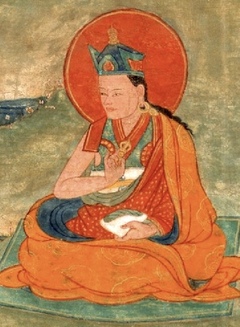Advice in Brief
Advice in Brief[1]
from The Essential Amrita of Profound Meaning: Oral Instructions and Practical Advice Bestowed Upon Fortunate Followers, Eye-opener to What is to be Adopted and Abandoned
by Chokgyur Dechen Lingpa
Rest the mind within the looker and, from within the state of vivid emptiness, let thoughts be spontaneously self-liberated without imputation or fixation.
Mañjuśrī taught the following instruction to the Sakya master Kunga Nyingpo:[2]
If you are attached to this life, you are not a Dharma practitioner.
If you are attached to samsara, you lack renunciation.
If you are attached to your own benefit, you lack bodhicitta.
If clinging arises, that is not the view.
The mahāsiddha Karma Pakshi[3] taught:
With great ease comes great meditation,
With middling ease comes middling meditation,
With lesser ease comes lesser meditation.
The Master of Uḍḍiyāna said:
Don’t be attached to the meditation. Deconstruct your attachment again and again. To let be in the uncontrived state is called cutting through (trekchö).
Please be sure to keep these instructions in mind.
This was written by Chokgyur Lingpa, the direct disciple of Pema Tötreng Tsal (Mighty Skull-Garlanded Lotus, Guru Rinpoché).
| Samye Translations, 2023.
Bibliography
Source text
mchog gyur gling pa, “rjes 'jug skal bzang rnams la bstsal pa'i zhal gdams bslab bya nyams len gyi skor spang blang mig 'byed zab don snying gi bdud rtsi.” In mchog gling bka’ ’bum skor. Vol. 36 of mChog gling bde chen zhig po gling pa yi zab gter yid bzhin nor bu’i mdzod chen po, 111–112. Kathmandu, Nepal: Ka-nying Shedrub Ling monastery, 2004.
Version: 1.0-20231206
-
The original text is untitled; this title has been added by the translator. ↩
-
That is Sachen Kunga Nyingpo (sa chen kun dga' snying po), 1092-1158). The four-line visionary teaching became renowned as Parting from the Four Attachments (zhen pa bzhi bral). ↩
-
Karma Pakshi (1204–1283) was the second Karmapa. ↩
